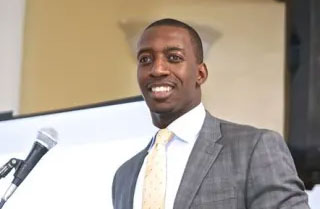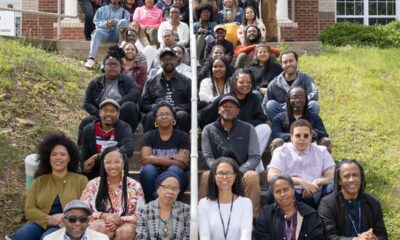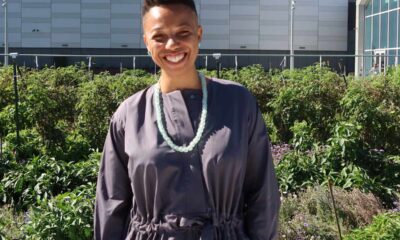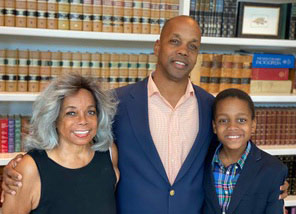Health & Wellness
Dr. Torian Easterling: COVID is Still Among Us

By Fern Gillespie
Our Time Press sought insights about the increase of COVID cases in New York City and had the opportunity to speak with renowned physician and COVID expert Torian Easterling, MD, MPH, Senior Vice President for Population and Community Health and Chief Strategic and Innovation Officer for One Brooklyn Health. Previously, Dr. Easterling gained national recognition as the First Deputy Commissioner and Chief Equity Officer at the NYC Health Department where he led the City’s equity response for the COVID-19 pandemic. This included ensuring equitable distribution of vaccines to populations and communities hardest hit. Dr. Easterling holds a bachelor’s degree from Morehouse College, medical degree from Rutgers-New Jersey Medical School, and a Master of Public Health from Icahn School of Medicine at Mount Sinai.
What was it like being a part of the early crisis of the COVID pandemic in New York City?
TE – I was there at the beginning of the pandemic when this became a public health emergency. It was a harrowing experience. We needed information very quickly incisively. Sometimes there wasn’t enough background information. But we knew we needed to get that information out to the public because people were clamoring for the details and what to do. At the very beginning of the pandemic, our hospitals became overwhelmed and they were issues of people not being able to see their families. Loved ones were dying without no one knowing. Those are things that we just cannot have we certainly in a country like this.
OTP- Are some people still stressed out from the pandemic and dealing with a COVID PTSD- post-traumatic stress disorder?
TE – It’s well-documented what we experienced during the pandemic where we saw increased levels of depression, anxiety, and stress among New Yorkers. I typically say that there isn’t one living person who hasn’t been impacted by COVID either directly or indirectly. You think about the direct effect of losing a loved one or being hospitalized yourself. But there’s the indirect effect of being isolated because your job has closed. Being isolated in a senior home because the home has closed and not being able to interact with others. As a result of it, people’s lives have been altered in so many different ways And we’re still feeling the effects of it. We’re going to continue to see the lingering impact of COVID particularly, not just physically like Long Covid, but also mentally. I think that as a public health system both our healthcare leaders and our public health leaders will be on alert.
What is EG.5 or Eris COVID variant?
TE – We saw that the virus that causes COVID-19 has the ability to mutate. We saw this during the Delta and Omicron wave and multiple sub-variants. This is no different. The World Health Organization is saying that EG.5 or Eris is not a variant of concern. We are seeing an increase in cases in New York City and in the United States. It’s the dominant variant.
What do you think about the new vaccine? Experts are talking about having vaccinations for COVID annually having the annual flu vaccinations.
TE – We are certainly headed in that direction. We see that COVID is here to stay. So all the mitigation measures that we were using like handwashing, wearing our mask, and making sure that we were staying away from others when we were ill will still continue to be useful. But with more discretion. Vaccines certainly will remain as part of those defense mechanisms that we will need. The vaccine that’s coming out in the fall will have protective antibodies.
Should there be some concern about a possible increase in COVID cases this summer?
TE – As we go through the summer, there’s been an uptick in cases so the state and the city’s Department of Health have been reporting this increase in data. We certainly see hospitalizations go up as well. We’re not seeing a large number of cases and individuals showing up in hospitals due to COVID. This new variant does not have the properties of showing severe illness like someone coming in with respiratory issues and severe fatigue. This is because we’ve reached a high level of vaccination. So what we’re seeing in our hospitals across the city is individuals are coming in with other issues, but as a result of coming in and getting tested and we’re finding them positive.
When should someone consider going to the hospital if they have a positive test at home for COVID?
TE – Individuals should make sure they test themselves and follow up with their primary care provider. Like previous variants under the Omicron lineage, this variant is also treatable. So, if someone tests positive and they have fatigue and general weakness they should absolutely see their physician because they may be eligible for the Paxlovid treatment within that immediate window. But this is still treatable and preventable. The goal is to keep people out of the hospital.
You’ve worked with the Black community dealing with COVID from the beginning. How did you handle the initial caution on the virus and vaccine?
TE – The highest rates of death for COVID-19 occurred in Black and brown communities in New York’s North and Central Brooklyn, Northern Manhattan, South Bronx, and Southeast Queens. We had to get out masks, test kits and vaccines. We heard concerns related to mistrust around the vaccine rooted in the healthcare system. Our communities have been mistreated and neglected. Black people have higher rates of illnesses like diabetes, hypertension, and heart failure which make us more susceptible to COVID-19. COVID is not over and we need to stay on alert. The Black community is most vulnerable.













